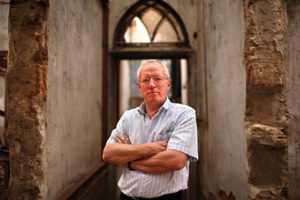By Robert Fisk
Israeli historian Benny Morris doesn’t do things by half. The footnotes of his new book on the 30-year genocide of Christians by their Turkish rulers, cowritten with his colleague Dror Zeevi, take up more than a fifth of the 640-page work. “It was nine years, a long haul,” he admitted to me this week, with an audible sigh over the phone. And he talks about the involvement of Ataturk in the later stages of the genocide of around 2.5 million Christians of the Ottoman empire; how “religions do drive people to excessive violence” – he has in mind the Turks, Isis, the Crusades – and even condemns the Arabs for their inability to criticise themselves.
The mere title of the Morris-Zeevi book, The Thirty-Year Genocide: Turkey’s Destruction of Its Christian Minorities 1894-1924 (to be published by Harvard University Press in April) is going to have the Turks enraged, from Erdogan down. The Armenians and other Christians will dispute his apparent claim that he has only just discovered that their slaughter lasted for 30 years – others have talked of the Armenian genocide of 1915 bookended by the late 19th-century massacres in Turkey and the post-1915 killing of surviving Armenians and Greeks, Assyrians and others. And the Arab world will challenge his view that the holocaust (my word) of Christians was more motivated by Islam than Turkish nationalism.
Having written about the genocide of the Armenians for 35 years, I have doubts that the actual call for “jihad” in the Turkish Ottoman empire unleashed at the start of the First World War was as ferocious as Morris makes it out to be. Muftis were indeed told they were in a holy war against Christians – but not against German Christians, Austro-Hungarian Christians, neutral Christians or allies of the Central Powers (Bulgaria, for example). Many Muslim worshippers, sitting on the carpets of mosque floors, must have shaken their heads in puzzlement at these caveats. Well, one way was to notice the German officers training the Ottoman army, the German diplomats and businessmen who witnessed the genocide of the Armenians with their own eyes, and wrote home about it. Hitler asked his generals who now remembered the Armenians just before invading Poland in 1939.
But again and again, I was brought up short by the sheer, terrible, shocking accounts of violence in Morris’s and Zeevi’s work. “Strident religiosity” moved through the Muslim lands, write the authors.
The date: 1895. The place: Severek. The witness: Armenian survivor Abraham Hartunian. “The first attack was on our pastor [Mardiros Bozyakalian]. The blow of an axe decapitated him. His blood, spurting in all directions, spattered the walls and ceiling with red. Then I was in the midst of the butchers. One of them drew his dagger … Three blows fell on my head. My blood began to flow like a fountain … The attackers [were] sure that I was dead … Then they slaughtered the other men in the room, took the prettier women with them for rape …”











